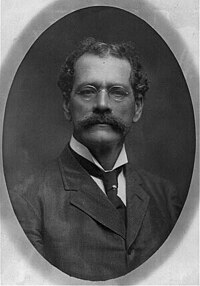Albert Estopinal
| Albert Estopinal, Sr. | |
|---|---|
 |
|
| United States Representative from the 1st Congressional District of Louisiana | |
|
In office November 3, 1908 – April 28, 1919 |
|
| Preceded by | Adolph Meyer |
| Succeeded by | James O'Connor |
| 24th Lieutenant Governor of Louisiana | |
|
In office May 8, 1900 – May 10, 1904 |
|
| Governor | W.W. Heard |
| Preceded by | Robert H. Snyder |
| Succeeded by | Jared Y. Sanders, Sr. |
| Louisiana State Senator from St. Bernard, Plaquemines, and Orleans parishes | |
|
In office 1880–1900 |
|
| Preceded by | Unavailable |
| Succeeded by | John Dymon |
| Louisiana State Representative from St. Bernard Parish | |
|
In office 1876–1880 |
|
| Preceded by | Robert F. Guichard |
| Succeeded by | B. L. Milladoun |
| Sheriff of St. Bernard Parish | |
|
In office 1872–1876 |
|
| Succeeded by | Esteve E. Nunez |
| Personal details | |
| Born |
January 30, 1845 St. Bernard Parish Louisiana, USA |
| Died | April 28, 1919 (aged 74) St. Bernard Parish |
| Political party | Democratic |
| Spouse(s) | Eliska Legier (married 1868–1919, his death) |
| Children | Albert, Jr., Fernando, Joseph, Benjamin, René, Clement, David, Leonidas, Frederick, and Lelia |
| Occupation | Planter |
| Religion | Roman Catholic |
Albert Estopinal, Sr. (January 30, 1845 – April 28, 1919), was a sugar cane planter from St. Bernard Parish, Louisiana, who served as a Democrat in both houses of the Louisiana State Legislature between 1876 and 1900 and in the United States House of Representatives from Louisiana's 1st congressional district from 1908 until his death at the age of seventy-four.
Estopinal was born in St. Bernard Parish, which is located to the east of New Orleans. He was a son of Joseph Estopinal (1816–1881) and the former Felicia Gonzales (1821–1865). Their ancestors came from the Canary Islands off the coast of Spain. Settlers in Louisiana from the Canaries are known as Islenos. Felicia was Joseph's second wife. Both were natives of St. Bernard Parish, the last of the sixty-four Louisiana parishes to be named. Estopinal attended public and private schools in St. Bernard Parish and New Orleans.
In 1862, at the age of seventeen, Estopinal left school to enlist as a soldier in the St. Bernard Guards of the 28th Louisiana Regiment. He began as an orderly sergeant in Company G. He fought in the Battle of Chickasaw Bayou in December 1862, the opening exchange of what became in July 1863 the decisive Battle of Vicksburg, Mississippi, in which he commanded a squad which transported prisoners from Indianola in Sunflower County in northwestern Mississippi, to Libby on the Gulf Coast.
On three occasions, Estopinal led the movement of prisoners to the Confederate capital at Richmond, Virginia. After Vicksburg, Estopinal was assigned to the quartermaster's department in Meridan in eastern Mississippi and then to the campaign in Mobile, Alabama, during which he was attached to the 22nd Louisiana Regiment Heavy Artillery. He surrendered and was paroled at Meridian. Throughout the war Estopinal was neither wounded nor taken prisoner.
...
Wikipedia
